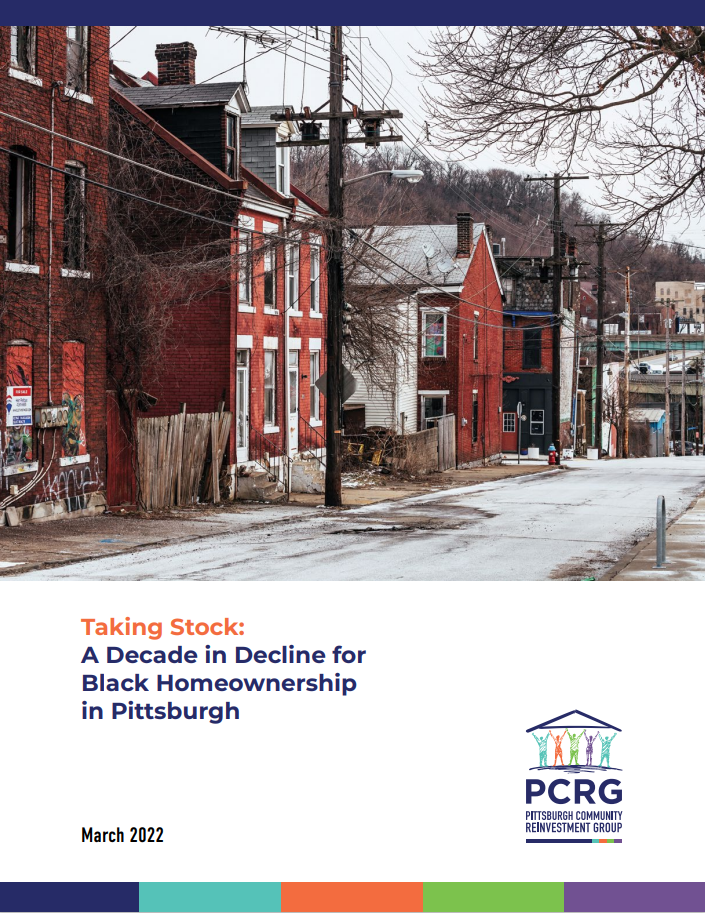
Taking Stock
A Decade In Decline For Black Homeownership In Pittsburgh
Pittsburgh’s Black population dropped by approximately 10,500 people, or 13.4%, from 2010 to 2020, compared to an overall 0.9% decrease in the overall population. During that same period median home prices in the region have increased significantly, with Pittsburgh’s median home value increasing by 69.5% from $88,000 in 2010 to $149,200 in 2019. Changing dynamics in previously affordable homes have led to fears of gentrification and displacement, and a growth in sales to corporate entities has reduced the supply of quality and affordable homes available. Corporate entities made up roughly 1 in 6 single-family residential housing purchases in 2020, up from 1 in 9 in 2010, causing further housing instability for Pittsburgh’s low- and moderate-income (LMI) homebuyers.
Black homeownership is considerably below non-Hispanic white homeownership in the Pittsburgh region. In 2019, the Black homeownership rate in the Pittsburgh metropolitan statistical area (MSA) was 31.4% - significantly lower than the non-Hispanic white rate of 73.0%, and the statewide Black home-ownership rate of 42.2%. Additionally, the home-ownership gap between Black homeowners and non-Hispanic White homeowners grew over the last decade, despite overall homeownership decreasing in the region. It is clear that the lending market in Pittsburgh and Allegheny County does not effectively serve the needs of Black households. This trend is driven by a growing income gap between Black and non-Hispanic white households and a lack of adequate credit for prospective Black borrowers, as well as gaps in external resources, financial education, and trust in the financial system from minority and LMI communities.
The result is a Pittsburgh that is increasingly segregated by socio-economic status. Nearly 75.0% of Pittsburgh’s Black communities reside in census tracts in the bottom 50th percentile of household incomes. These tracts consistently have higher family poverty rates, vacant housing units, lower household incomes, and additional factors that make homeownership increasingly unattainable. The Pittsburgh Community Reinvestment Group (PCRG) recommends passing legislation to create a statewide Community Reinvestment Act (CRA) in Pennsylvania, which applies to banks, credit unions, and other non-depository lenders with an enhanced focus on racial equity. As of 2019, 99.1% of all banks received federal CRA ratings of either “satisfactory” or “outstanding” despite continued racial inequalities in lending. Through our banking working groups, PCRG has already created a list of local mortgage products geared towards LMI and first-time homebuyers. PCRG will leverage existing relationships with financial institutions and our member organizations to increase financial education programs and rebuild trust in underserved communities.
Additionally, PCRG is calling on the City of Pittsburgh to dedicate more resources to assist homebuyers and remedy the loss of affordable housing inventory. We recommend allocating additional funds towards down payment and closing costs assistance programs to assist first-time and LMI homebuyers. To support sustainable and high-quality affordable housing, PCRG advocates for more funding and capacity at the Pittsburgh Land Bank. A land bank modeled after best practices, with robust dedicated funding and government support, will be a critical tool in addressing the loss of affordable housing at cost to scale. Lastly, PCRG is strongly encouraging local economic leaders to address the growing wage disparity. Without sufficient wage growth, Black and LMI households will continue to lose ground in homeownership and risk displacement within Pittsburgh.